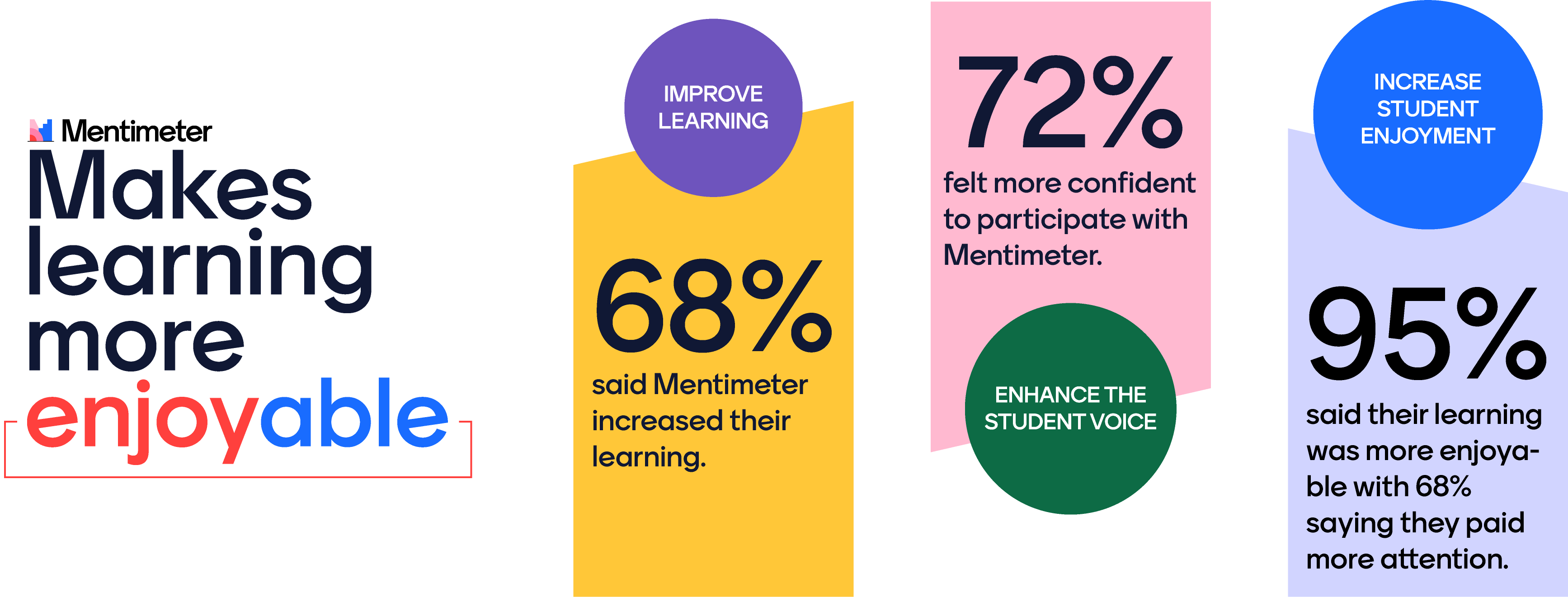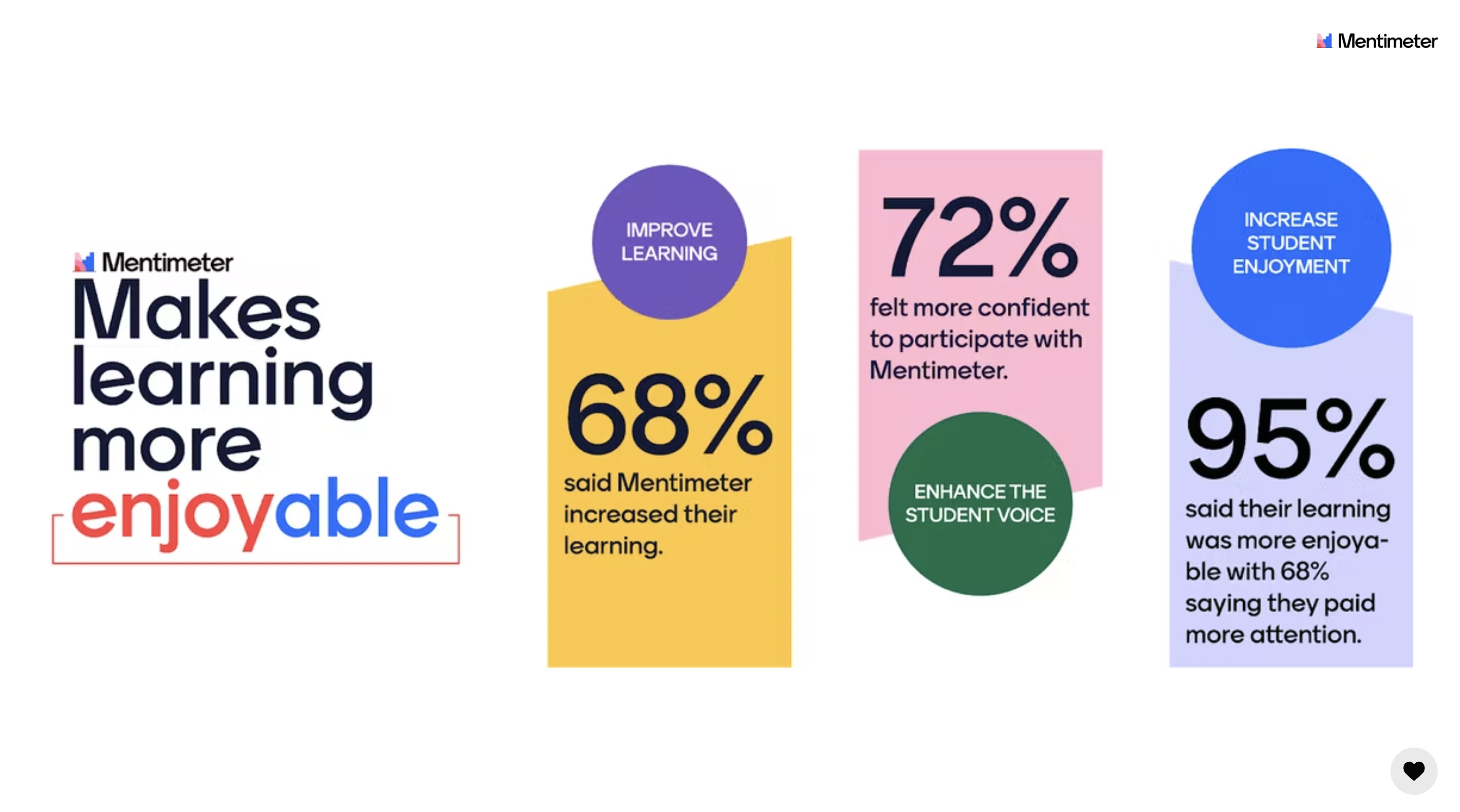Education professionals are often faced with the challenge of trying to get students to engage in the classroom. During the pandemic, this struggle has been highlighted with the addition of trying to do it online. Students not having the camera on, not contributing in class discussions and simply just not being engaged were obstacles educators had to overcome.
Audience response systems (ARSs) like Mentimeter can be used synchronously whilst presenting or teaching and allows educators to ask a range of questions, gaining responses in real-time. It helps to create a dialogic approach and makes sure that teaching isn’t a one-way conversation. Not only that, but Mentimeter requires no additional technology as students use devices they already have, such as a phone or laptop to contribute to the session.
Mentimeter enables educators to collect valuable information on student’s perspectives, comprehension, content retention and creates a dynamic and agile learning environment shifting towards a more student-centred approach to learning.
The University of Reading recently conducted research on the impact of Audience Response Systems on student and staff learning experience and explored how Mentimeter affected student engagement. The study conducted by The University of Reading highlighted three main themes that emerged from using Mentimeter in educational settings. We will explore each theme in more detail.
- Mentimeter increases student enjoyment
- Mentimeter enhances the student’s voice
- Mentimeter improves student understand, learning and retention.

Mentimeter increases student enjoyment
Student enjoyment is closely linked to engagement in class. If a student enjoys a class they are more likely to engage and pay attention. Introducing Mentimeter to the classroom helps to engage students and keep them focussed throughout. 95% of students said that their learning was more enjoyable with Mentimeter and helped to keep them “engaged when you drift away”. Moreover, students’ attention increased by 74% in comparison to sessions that did not use Mentimeter.
Students in the study highlighted that Mentimeter helped to make learning more interesting, fun and energising. The interactive questions allowed students to interact with their educators and form a more dialectic relationship. One student mentioned that “it’s not just someone talking at you...interacting with lecturers rather than just sitting and listening makes it easier to pay attention.”
Mentimeter enhances the student’s voice
The anonymity that Mentimeter provides encourages all students to contribute and engage without the fear of retribution or humiliation. The study showed that 72% of students felt more confident to participate through Mentimeter. One student noted that Mentimeter can help to include “thoughts and ideas of students who would otherwise be hesitant to answer or contribute in lectures.”. Another student praised the benefit of anonymity, “it helps people like me that struggle with anxiety and it is pretty fun, to be honest.”
Mentimeter facilitates teacher-student interaction. Students can ask questions whenever one crops up and many feel much more comfortable with contributing or answering questions in an anonymous setting. In fact, 76% of students from this study liked the anonymity because it encouraged them to engage and participate.
Not only does Mentimeter facilitate student to teacher dialogue it also helps with peer-to-peer interaction. Educators can use the voting results as a basis for further discussion or group work. 72% of students recognized that Mentimeter helped them to feel connected and part of a learning community. Some students took comfort in the fact that they could see their peers responses and didn’t feel alone in answering the wrong questions.
Mentimeter encourages every student to be heard, creating diverse and interesting discussion points. It also creates an inclusive environment where every student can participate, no matter their ability, their confidence levels or anything else hindering them from answering vocally.
Although the anonymity may be a concern to some education providers the ability to use the profanity filter in many languages means you can filter out any unwanted responses. You can also delete unwanted entries in the Word Cloud Question or Open-ended Question types.
You also have the option to hide answers until everyone has submitted their response to avoid students copying one another and to give everyone a chance to think on their own.
Mentimeter can help to improve student learning
Mentimeter provides a holistic approach for teachers to harness. It can be used at every stage of the teaching cycle - before, during and after a class.
Overall, Mentimeter has a positive impact on learning, 68% of students said that Mentimeter increased their learning. Mentimeter helps to check knowledge, understanding and identify any knowledge gaps. It pinpoints topics that need more attention, further teaching or areas that students personally feel they need to work on after the class.
Mentimeter helps knowledge retention by actually applying the information they heard and putting it into practice. One student recognized that Mentimeter “allowed us to think critically rather just absorb information.”
Mentimeter helps educators be more flexible in their teaching. Teachers can adapt the education material from students input, improving the content and tailoring it to their students’ needs. Whether you use Mentimeter to send a pre-class survey or use it live in class, educators have the opportunity to adjust content for that specific student group.



